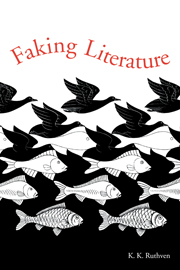Book contents
- Frontmatter
- Contents
- Acknowledgements
- List of abbreviations
- Prologue
- 1 Sampling the spurious
- 2 Framing literary forgery
- 3 Cultivating spuriosity
- 4 Faultlines of authorship
- 5 Fantasies of originality
- 6 Rhetorics of authenticity
- 7 Fake literature as critique
- Epilogue
- Bibliography
- Index of names
- Index of Subjects
2 - Framing literary forgery
Published online by Cambridge University Press: 22 September 2009
- Frontmatter
- Contents
- Acknowledgements
- List of abbreviations
- Prologue
- 1 Sampling the spurious
- 2 Framing literary forgery
- 3 Cultivating spuriosity
- 4 Faultlines of authorship
- 5 Fantasies of originality
- 6 Rhetorics of authenticity
- 7 Fake literature as critique
- Epilogue
- Bibliography
- Index of names
- Index of Subjects
Summary
Coming to terms with literary forgery involves thinking about the overlapping descriptors that constitute our understanding of it. In this area of enquiry, prescriptivism is commonplace. Its consequences are illustrated by Bruce M. Metzger, a biblical scholar who seeks to dissociate literary forgeries from those spurious writings sometimes called ‘pseudepigrapha’, a collective term for texts which either bear ‘a false title’ or are ‘ascribed to another than the true author’ (OED). In order to do so he decides that ‘an intention to deceive’ distinguishes a literary forgery from a pseudepigraphon. Further-more, he thinks that pseudepigrapha are not ‘spurious writings’ (which is how the OED defines them) but ‘works wrongly attributed to authors’. That distinction enables him to claim that ‘not all pseudepigrapha … are to be regarded as forgeries’. Are pseudepigrapha therefore apocryphal (‘of doubtful authenticity’)? Not according to Metzger, who argues that ‘the term “apocrypha” belongs to the history of the canon’ rather than to the history of authorship, and that ‘the question of false attribution played very little part’ in theological discussions about which non-canonical books ought to be included in the Apocrypha. He therefore thinks it ‘better’ to reserve the term apocrypha for ‘all extra-canonical writings, and to use “pseudepigraphic” as a literary category, whether the book is regarded as canonical or apocryphal’. In Metzger's view, theologians create unnecessary problems by their ‘lack of agreement on what differentiates literary frauds from innocent pseudonymous impersonations’.
- Type
- Chapter
- Information
- Faking Literature , pp. 34 - 62Publisher: Cambridge University PressPrint publication year: 2001



